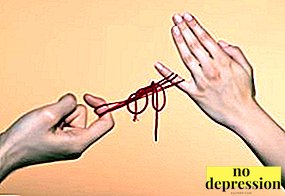Often, a person who suffers from alcoholism and his close people - a partner or spouse, parents, friends - often has alcohol codependency.
This is a common form of codependency - destructive type of relationshipin which a person is deeply immersed in the life of one who is dear to him, actively plays the role of "savior."
What it is?

Codependency - a kind of relationship, pathological from the point of view of psychology, which is characterized by the emergence of an extremely strong dependence on another person, the desire to constantly help him to his own detriment, to be continuously in his life, to control it.
People having co-dependencies, actually live the life of the one they depend onand not your own.
Both parties suffer from codependency - the dependent person and the one they depend on. At the same time, breaking such relationships or making them healthier is extremely difficult.
Codependency may occur in any close relationship: between parents and children, between partners, friends, between close relatives.
But, as a rule, for the emergence of codependency, one of the participants in the relationship must seem to weak: have dependencies (alcohol, drugs, gambling and so on), somatic or mental illness, vulnerable, sensitive nature.
The other participant, on the contrary, must be ready to play the role of “savior”: the one who will always be there, will follow, support.
Eventually "savior" extremely attached to the one about whom he took the "care", and his life tightly intertwined with another life.

In this case, codependency implies mutual dependence, based on the interpretation of the term, which is translated as "Joint dependence".
And another, conditionally or truly weak person also usually becomes dependent on the “savior”.
But he is not always happy, being in such a relationship: permanent custody prevents him from developing, getting rid of addictions, he is “preserved” in the current situation and gets used to the idea that he cannot get better, becomes more helpless.
Worst of all, if the one to whom the “savior” is attached is toxic - has pathological dependencies, he periodically resorts to violence and turns your own life (and the life of one who is attached to it) to hell.
But since the “savior” has a deep psychological dependence, it is very difficult for him to escape even from such a person.
Codependency arising in a relationship with an alcoholic is most often observed between a husband and wife.
The classic “husband gets drunk that year, and the wife tolerates and believes that he will stop, justifies his behavior, does everything for him” - it's about codependency. About 80-100% of close relatives of alcoholics have a pathological attachment to it.
The reasons
The main factors that increase the likelihood of co-dependency:
- Close relationship with a person who is dependent on alcohol, frequent interactions with people involved in co-dependent relationships with alcoholics. A person who is in an environment where codependency is extremely common may find it normal. In the future, being guided by this, he will assure himself that “Everyone lives this way” and “Somehow others cope”, not daring to change anything, leave. It is often observed in the so-called "lower classes" of society, in which violence and dependence on drugs and alcohol are part of life. Also, entering into a relationship with a frequent drinker, it is important to understand that most of these connections lead to codependency.
- The influence of the environment. Codependencies are more often affected by people who grow up in unhealthy families: in those where violence is practiced, where parents suffer from phobias, severe mental disorders, where children are tightly controlled, they are overly wary.
It may also occur under the influence of regular violence from other people outside the family: for example, classmates.
- Experience of alcohol dependence. It is easier for people who are addicted to engage in unhealthy relationships, which are essentially all the same addiction, but presented in a different wrapper.
- Unrealistic view of the world, formed under the influence of education (including gender). A woman is traditionally imposed the role of the keeper of the hearth, who devotes her whole life to her family, husband, children, selflessly loves a spouse, even if he creates significant difficulties, behaves disgustingly. Personal weakness (meekness, obedience) is encouraged, and strength (initiative, self-confidence), on the contrary, is not considered the best trait for a woman. Therefore, it is easier for women to get into co-dependent relationships. Also in society, in principle, sacrifice is encouraged, the willingness to help in any situations, and the desire to put oneself in priority is condemned.
- Having fear of loneliness. Fears, including unaccountable ones, significantly affect how a person behaves, what decisions are made. A woman is able to stay with a man drinking for years out of fear that she will not find anyone else and will suffer for years.
And the stronger her fear, the harder it is for her to realize the need for change and start working on her own life.
- Low self-esteem. People with low self-esteem need encouragement from the outside, they want to be useful, to help someone in order to receive this encouragement and to feel that they are not useless, at least periodically. At the same time, it is difficult for them to realize that they may deserve the best, because they consider themselves worthless. And a woman with low self-esteem, who remains with a man drinking, can be convinced that this is what she deserves, that such a life is the best that she can get.
- Mental diseases. Depression, neurosis, and other mental disorders significantly increase the likelihood of developing addictions, especially amid falling in love. A depressed person lives with difficulty, he is not interested in anything, he is devastated. If during this period he finds something that fills his life with meaning, gives positive emotions (including those related to the action of hormones produced on the background of being in love), he may develop an addiction.



Signs of
The main features are:
- Thoughts and desires revolve around a person addicted to alcohol. The “Savior” constantly worries about who he is attached to, his immediate and delayed plans are closely connected with him.
- Lack of own life goals. The interests of people in co-dependents are few, and in the process of living with an alcoholic, they can almost completely disappear.
They have no desire to realize themselves through work, to achieve something, to develop. Their life is devoted to an alcoholic.
They accompany him, take care of him, pity, arrange his everyday life.
- Indifference to their own needs and desires. Codex addicts adapt to the person they depend on, they often think that it’s selfish to think about themselves and that the one they care for needs much more help than they do.

Women living with husbands who drink, tend to think that love looks like this: as an overcoming, when you need to reconcile with any shortcomings of a lover, to accept him unconditionally, even when life with him is impossible.
How to get rid?
Key recommendations:
- Be aware of the problem. It is important to find signs of codependency and to understand that it is necessary to change the situation.
The realization that there is a problem and it is necessary to work with it is already a considerable step.
To feel fear, not to be sure that something will work out, to panic at the thought of radical changes is normal. In principle, people hardly break down what they have been in for a long time, what has become part of their lives. Remember: you can change the situation gradually, step by step, winning back your right to be considered an independent person.
- Start to restore your own personality. Our personalities consist of many elements: interests, needs, desires, worldview, experience, knowledge. Try to switch from thoughts about a dependent person to thoughts about yourself. Ask yourself what you want, what it would be interesting to do.
 Try to do a hobby. If one thing does not cause interest, try other activities, read books, watch movies, look for the branches of knowledge that attract you. It can often be helpful to return to what you were interested in before, before meeting with an alcoholic. Think about your old hobbies, interests, look at them again.
Try to do a hobby. If one thing does not cause interest, try other activities, read books, watch movies, look for the branches of knowledge that attract you. It can often be helpful to return to what you were interested in before, before meeting with an alcoholic. Think about your old hobbies, interests, look at them again. - Learn to separate yourself from an alcoholic, more often think about your needs. Put yourself in priority and in small things, and in more global things. Satisfy your basic needs in time, do what you are interested in, rather than re-starting to care about who you feel addicted to. It is also important to start thinking about the possibility of breaking the pathological relationship.
- Address to the psychologist, the psychotherapist. It is not always possible to get rid of codepeness alone, and this is normal. The specialist will be able to analyze your situation and give useful recommendations, prescribe the treatment of mental diseases, if it identifies them from you, help you learn to express negative emotions and criticize.
When codependency disappears or weakens noticeably, it will be much easier to realize the need to break up relations.
Psychologist tips
How to quit an alcoholic? Basic tips:
- Try to get rid of codependency. It is extremely difficult for a person who has been in a dependent relationship for a long time to realize the need for change and decide on it. His personality is distorted, he does not feel his own "I" and does not represent his life without whom he depends on. Therefore, the first step should always be work with psychological dependence, with personality, with self-esteem.
- Think of a plan of action. Consider how you will live the first time after you sever relations with an alcoholic (if he is a spouse), discuss this issue with your relatives, and enlist their support if possible.
If you do not have a source of income, it is important to find it before you leave.
- Do not let yourself regret it. It is much more difficult to get rid of co-dependency and to leave if you continue to see in an alcoholic a weak-willed victim who needs constant care, control, care. First, alcoholics living in a co-dependent relationship become even weaker and helpless, because everything is done for them, and the lack of a “helper”, on the contrary, may increase the likelihood that a person will want to be cured. And secondly, you must always think about yourself and your needs. Happiness in life with alcohol addicts a bit.
- Tell him clearly about your intentions. Avoid the words “plan,” “maybe,” “most likely,” “think.” Your task is to prepare everything yourself and put before the fact. If he notices doubts, he will begin to try to stop, begin to talk about what he will stop drinking (and these words must have been spoken to them several times already). Do not believe. Take care of yourself.


Getting rid of codependency does not happen quickly, so it is important to tune in to long-term work with yourself, which can continue after you break off your relationship with an alcoholic.
Overcoming codependency with alcoholism - advice from a psychologist:

 Try to do a hobby. If one thing does not cause interest, try other activities, read books, watch movies, look for the branches of knowledge that attract you. It can often be helpful to return to what you were interested in before, before meeting with an alcoholic. Think about your old hobbies, interests, look at them again.
Try to do a hobby. If one thing does not cause interest, try other activities, read books, watch movies, look for the branches of knowledge that attract you. It can often be helpful to return to what you were interested in before, before meeting with an alcoholic. Think about your old hobbies, interests, look at them again.

